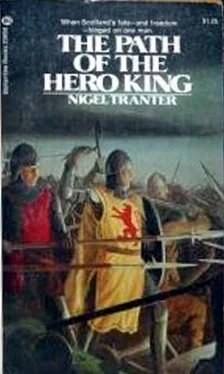Bruce even had squads of men watering the turfs, like monks in a garden.
Then, in mid-June, word reached the King that the invasion had indeed started. The English had crossed Tweed with an incalculable host, its baggagetrain alone extending for twenty miles.
King Edward was leading in person, with the High Constable, the Earl of Hereford, and the Earl of Gloucester as deputies. Rumour had it that there were no fewer than ninety-three other English barons and lords present, with their levies, not to mention great contingents from Wales, France, Brittany, Guienne and the Low Countries. There were said to be twenty-three Anglo-Irish chiefs under the Earl of Ulster, Bruces own father-in-law. Total numbers were impossible to ascertain, accounts varying from 70,000 to 200,000. Not that such figures were really significant. None knew better than Bruce that the true worth of any army depended not on sheer size-since this could only add to the problems of commissariat and mobility-but on its spirit, leadership and composition.
It was that composition he demanded of his informants now; above all, what were the numbers of heavy armoured cavalry, and of long bowmen -the two vital arms in which Scotland was weakest Reports were now flowing in to the Scottish camp below the frowning battlements of Stirling, in a steady stream. The English were advancing, not by Berwick and the coast, but up Tweeddale and Lauderdale. They comprised ten distinct divisions, with Herefords and Gloucesters in the van. Cavalry might number 40,000 or 50,000, but the heavy armoured chivalry, the knightly host, would be perhaps a tenth of that. Archers could be put at 7,000. Infantry was without number.
These figures, although still vague, were daunting. In a set battle,
as this must be, the heavy chivalry were allimportantthat is, knights
and their like in full armour, mounted on destriers also fully
armoured. Since the mens full armour weighed up to too pounds, and
the beasts five times that, only the most powerful horses could carry
it for any length of time. Inevitably these were slow-but they were
almost impervious to any assault save of their own kind. And of such
Bruce would be hard put to it to raise too; Scotland just did not breed
such horses. Of light horse, moss-troopers and the like-hobelars, the
English called them-he had perhaps 4,000; but against armoured
chivalry these were of little avail, however splendid at mobile
warfare. As to archers, he did not have 500, and no long bowmen
And still no sign of Angus Og and the Islesmen -though it was known that they were on their way.
Bruce drew up his army in four main divisions, facing east so as to cover both possible approaches. The van, of picked infantry, with their long pikes for forming schiltroms, he put under his nephew Moray, as a sufficiently sober and steady man not to lose his head in the face of overwhelming odds. Edward, of course, wanted this place of honour; but his brother just did not dare risk it, with all at stake. Edwards brilliance was as a dashing commander of light cavalry, not the spearhead of a static and defensive host. He gave him instead half of the light horse, to hold the right flank, based on the line of the Bannock Burn. The other half was for Douglas, on the left-although nominally commanded by the High Steward; old James Stewart had recently died, and young Walter was now the Steward, a notable youth but inexperienced.
Bruce himself commanded the main body, not exactly in the rear but somewhat back on the higher ground, where he could survey all, and especially the approaches to The Entry. Randolphs van was based on St. Ninians Kirk, a strategic site above the Carse route.
It was Saturday, the Eve of the Vigil of St. John the Baptist, the 22nd of June-midsummer. Spies declared the English van to be at Falkirk, only ten miles away-though its rear guard and baggage was still rumbling through Edinburgh twenty-five miles to the southeast There was little sleep that night, and at four a.m. of a misty dawn, trumpets in the Scots host called men to Mass. There had to be, of course, many services-but there was an ample sufficiency of clergy, armed and armoured, to provide them. William Lamberton himself celebrated for the Kings company. He sternly prescribed only bread and water for the days substinence, as the Vigil required-poor fare as it was on which to fight a vital battle but he knew his fellow-countrymen, and the streak of fanaticism in them.
Bruce was still concerned to have detailed news of his enemys numbers and quality, assessed not just by spies but by experienced commanders. He sent out a swift-riding va dette under Douglas and Keith the Marischal, to gain him the information he needed, risky as this was.
Then, as they stood to arms, the King reviewed his whole force, riding
round the divisions, alone, on a small and wiry grey gar ron
He was clad in light chain-mail, under a gorgeous heraldic surcoat of the red Lion Rampant on gold, and on his helmet was a leathern crest of a demi-lion, ringed by a high crown. His review took a long time, with so many to exchange a word with-for surely never had a king and commander known personally so many of his host, veteran warriors with whom he had fought almost continuously for seventeen long years. Always concerned with the personal touch, today, which might well be the last for him as for them, he-desired his identification with all to be complete. Besides, this uneasy waiting period had to be got over.
As he went his rounds, however, Bruce looked all too often back over his shoulder, westwards. Had he misjudged one man, in all these-Angus Og MacDonald?
Then back through the secret glades of the Tor Wood came Douglas and Keith, grave-faced. They had risked much, got very close to the enemy, and spoken with many scouts who dogged the English columns. And what they had seen and heard obviously had affected them direly.
The van is not far off, Sire, Douglas reported, panting.
Indeed, it should be In sight at any time. The main host covers all the plain between the Sauchie Ford and Falkirk. And far beyond. I have never seen the like. As far as eye can see …
Sir James, the King interrupted him harshly.
Of course you have never seen the like! I did not send you out to tell me that.
Such stories we have been listening to for days. I want facts. Firm details. Have you brought me none?
Flushing, the younger man swallowed.
Yes, Sire. The van is of medium cavalry, under Gloucester and Hereford-about 6,000. It is said that there is bad blood between these, for though Hereford is High Constable of England, their King has appointed his nephew Gloucester, although but twenty-four, to be Constable for this battle. They have 500 mounted Welsh archers …
Pembroke? He does not ride with the van?
No-not Pembroke. But Clifford does …
Ha-Clifford! Clifford came too late for Loudoun Hill!
Pembroke, under King Edward, commands the main chivalry, Your Grace, Keith put in.
Three or four thousand strong, of barded des triers a terrible sight.
terrible sight!
His informants said nothing.
It is my aim to make this an infantry, not a cavalry battle, God willing, the King went on.
Where is the English infantry?
Well back, Sire, I fear … the enemy will it otherwise. They will have it a cavalry battle.
So much the better-so long as I choose the ground! It is all important, therefore, that this day be fought where I want it. Yon understand? This day-and all days to come-depends on it And, for the sweet Christs sake-lift your visages! Smile, my friends! Men are watching you. Would you lose all, before we begin? I am fighting this battle with the land, and mens spirits.
Читать дальше












